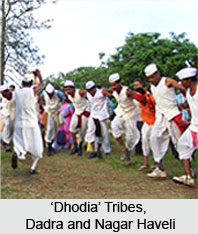 Dhodia tribe of Dadra and Nagar Haveli constitute about 16.90% of the aggregate population of this Union Territory of India which is existent between Maharashtra and Gujarat. This Union territory of India was under the Portuguese colonial rule. Between 1954 and 1961, it became self governing system of administration. Dadra and Nagar Haveli is a minute point on the map of India, away from the hustle and bustle of modernity, snug amid its tribal ethos, gives it the charm of obscurity. Silvassa, a small, sleepy and cheerfully green capital city is a perfect place of tribal mystery.
Dhodia tribe of Dadra and Nagar Haveli constitute about 16.90% of the aggregate population of this Union Territory of India which is existent between Maharashtra and Gujarat. This Union territory of India was under the Portuguese colonial rule. Between 1954 and 1961, it became self governing system of administration. Dadra and Nagar Haveli is a minute point on the map of India, away from the hustle and bustle of modernity, snug amid its tribal ethos, gives it the charm of obscurity. Silvassa, a small, sleepy and cheerfully green capital city is a perfect place of tribal mystery.
They have been following their age-old traditions and customs since several years and are quite fond of performing numerous kinds of dances, songs and rituals. Various folklores and mythological tales are associated with the Dhodias and Dhodia language is employed by this tribe, which is also the language used by the Bhils. However, the Bhils are considered to be of an inferior rank by the Dhodias and they choose to alienate themselves from the Bhils. Unlike Bhils, they do not utilize bows and arrows.
These regional tribes of Dadra and Nagar Haveli are generally polygamous and practise the system of `buying` their own wives. This is usually done, even before waiting for them to be of a marriageable age, or when they can attain maturity. When the husband of a woman dies, she is married to the brother of the deceased husband and continues residing in the same household. Dhodias are followers of Hinduism and observe `Raksha Bandhan` and other Hindu festivals. Fishing and communal feasts are often conducted by these tribes.
However, of late Dhodias of this region have adapted to a modern lifestyle, settling in professions like farming. Urbanisation has motivated Dhodias to make a gradual shift from their traditional occupations. Agriculture is their main occupation and activities of hunting and fishing are practised as avocation. They are clad in bright garments and jewels made of silver, coloured stones and also beads. Dhodias stay inside thatched mud huts made of bamboo and roofed tiles. They have great faith in deities which are made of stone and coloured wood and are known to be superstitious and are addicted to country liquors. Dhodias belong to the Scheduled Tribes of India.
















